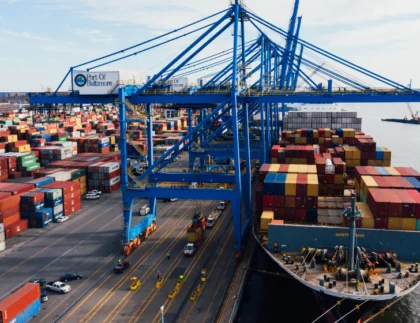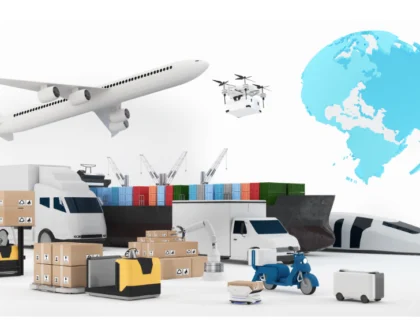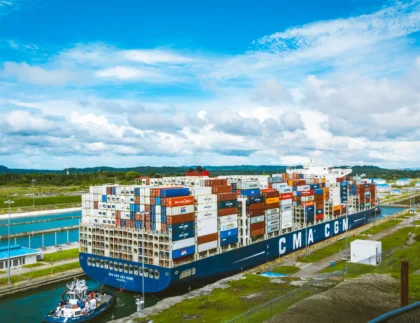
The freight forwarding sector is essential to international trade because it ensures that products travel smoothly across borders and arrive at their destinations on schedule. However, conventional freight procedures frequently have inefficiencies, excessive paperwork, and a lack of transparency.
The emergence of blockchain technology is changing the logistics industry. A game-changer, smart contract logistics offers increased automation, security, and efficiency.
Understanding Smart Contracts in Logistics
Smart contracts are self-executing contracts with the terms of the agreement directly written into code. These contracts automatically enforce and execute actions when pre-set conditions are met. In logistics automation, smart contracts reduce the need for intermediaries and minimize the risk of human error.
Smart contracts simplify complex processes like shipment tracking, documentation, and payment releases for freight forwarders. Companies can achieve faster and more reliable operations by integrating automated contracts into freight systems.
Smart contracts are about automation and trust. Traditional contracts often require intermediaries such as lawyers, brokers, and banks to ensure each party fulfills its obligations. Using blockchain technology, smart contracts eliminate the need for these third parties, making processes more cost-effective and efficient. This results in reduced operational costs and quicker turnaround times.
Blockchain Freight: The Backbone of Secure Logistics
Blockchain freight solutions provide an immutable and transparent ledger that records every transaction across the supply chain. This decentralized approach enhances logistics transparency by offering real-time visibility into shipment status and conditions paired with secure transactions; blockchain ensures that data integrity remains intact. Every update on the blockchain is time-stamped and visible to authorized parties, reducing the chances of fraud or manipulation.
The decentralized characteristics of blockchain technology ensure that all blockchain technology's decentralized characteristics are true. This level of transparency significantly reduces conflicts and fosters improved collaboration among freight forwarders, shippers, and customs officials. A secure and immutable record of transactions upholds the integrity of the supply chain.
Additionally, the efficiencies realized through blockchain technology reduce paperwork and administrative burdens. Smart contracts facilitate the automation of documentation tasks, including issuing bills of lading, customs declarations, and letters of credit—consequently, this streamlining results in quicker clearance times and fewer errors.

Benefits of Smart Contracts Logistics
1. Logistics Transparency
Transparency is crucial for building trust in supply chain operations. Smart contract logistics offer complete visibility into every stage of freight movement. Stakeholders can access shipment location, condition, and handling data without relying on manual updates.
Better accountability is a direct result of more transparency. Tracking the history of cargo is simple because every action on the blockchain is recorded and cannot be changed. This lowers the possibility of misplaced or improperly handled cargo.
2. Secure Freight Management
With secure freight management, sensitive information like invoices, delivery notes, and payment records is encrypted and stored on the blockchain. This minimizes the risk of data breaches and ensures that only authorized personnel access the information.
Smart contracts also facilitate secure transactions by automatically verifying that all conditions have been met before releasing payments. This reduces the likelihood of payment disputes and promptly compensates service providers.
3. Supply Chain Integrity
Automated systems make maintaining supply chain integrity easier. Smart contract logistics automatically verify compliance with contractual terms, such as temperature control, shipment deadlines, and quality checks. Any deviation from these terms triggers an immediate response, ensuring standards are consistently met.
This degree of automation guarantees that quality requirements for perishable commodities and delicate cargo are upheld throughout the supply chain. Innovative contract-integrated automated monitoring systems can send notifications and take corrective action when conditions depart from predetermined boundaries.
4. Automated Contracts for Efficiency
By deploying automated contracts, logistics companies reduce the time spent on manual paperwork and approvals. Payments, for instance, are automatically released when shipment milestones are reached, reducing delays and improving cash flow.
Automated contracts improve productivity by expediting the procurement and vendor management procedures. With smart orders, inventory can be managed without human involvement. Smart orders allow for the management of inventory without human intervention, the issue of buy orders, and the tracking of deliveries

Real-World Applications of Blockchain in Freight
Many global freight companies are already harnessing blockchain technology to streamline their operations. The potential applications are vast, from digital bills of lading to automated customs clearance. By adopting blockchain freight systems, companies can optimize efficiency and reduce costs associated with intermediaries and disputes.
The use of blockchain technology to track pharmaceutical shipments is one prominent example. Because temperature control and product authenticity are subject to strict regulations, blockchain's visible and unchangeable ledger guarantees compliance across the supply chain.
Another application is in automotive logistics, where blockchain tracks parts and components from manufacturers to assembly lines. This ensures that only genuine parts are used and reduces the risk of counterfeit products entering the supply chain.
Businesses looking to implement these innovations must work with experienced technology partners
Challenges and Considerations
While the benefits of smart contract logistics are clear, there are challenges to consider. Implementing blockchain technology requires significant investment in infrastructure and training, and companies must ensure that their digital systems are compatible with blockchain solutions.
There is also the question of scalability
Slower processing times may result from blockchain networks becoming crowded as transaction volume increases. Blockchain technologies that provide high throughput and low latency are essential for freight forwarders.
Data privacy is an additional issue. Despite the openness provided by blockchain, sensitive data must be protected by encryption and access controls. Companies must strike a balance between visibility and confidentiality.

The Future of Logistics Innovation
As the freight forwarding industry evolves, integrating smart contract logistics will become more widespread. The shift toward logistics innovation driven by blockchain promises faster, safer, and more efficient supply chains.
In the coming years, we expect greater interoperability between blockchain networks, enabling seamless data exchange across global supply chains. The development of standardized protocols will further enhance collaboration between stakeholders.
For more insights on freight forwarding technology, check out our articles on Global Trade Compliance and Regulatory Updates, E-commerce Trends in International Freight Forwarding, and Risk Management in Maritime Freight Forwarding.











